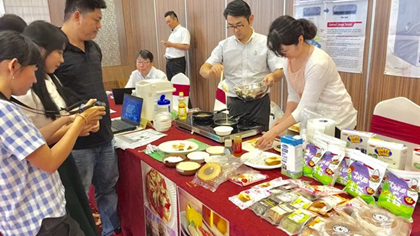Mekong Delta plans hi-tech moves
The Mekong Delta region seeks to improve agricultural production and seafood processing by increasing partnerships with countries that have expertise in advanced technologies, the director of the Vietnam Chamber of Commerce and Industry’s Can Tho chapter has said.
 |
| A booth at the conference showcases Japanese snacks and cakes made of Vietnamese flour (Photo: VNA) |
Speaking at the fourth annual Mekong Delta Investment Conference that began yesterday in Can Tho, Vo Hung Dung said the delta region “has great demand for agricultural mechanisation and smart technologies development”.
With favourable conditions for agriculture, the delta “plays an essential role in the country’s socio-economic development,” he added.
The conference aims to promote cutting-edge technologies and improve cooperation between delta firms and foreign partners in hi-tech agricultural trade and investment.
The event, which ended on November 13, is also showcasing agricultural technology machinery and equipment from Japanese companies.
Yuichi Nishizawa, of Tokyo-based Vox Trading Co. Ltd., which exports rice powder mills, said the conference was a platform for his company to introduce smart technologies in food processing.
Truong Quang Hoai Nam, Vice Chairman of the Can Tho People’s Committee, said the Mekong Delta had an advantageous geographical position and abundant natural resources, and that the business environment had improved since 2009.
The region supplies more than 90 percent of the nation’s rice and 50 percent of seafood, as well as many other agro-forestry-fishery exports every year.
In the next 10 years, the region’s economy is expected to achieve a high growth rate, supported by the rapid improvement of transport and electronics as well as low labour costs and an abundant food supply.
Vo Hung Dung said investment prospects in the region’s food sector were relatively high, considering the many free trade agreements Vietnam had already signed, including the Trans-Pacific-Partnership (TPP) and the Vietnam-European Union Free Trade Agreement.
In addition, Dung pointed out that there were many challenges facing the region, especially the agriculture sector, including climate change.
Dung also said the use of advanced technologies in agricultural production and processing to add value was still limited.
The rate of mechanisation in agriculture remains modest and is only 65 percent for rice harvesting.
“These factors have resulted in low productivity, value addition and competitiveness,” Dung said.
Every year, rice farmers in the region have incurred a loss of more than 3.2 trillion VND (143.32 million USD) during post-harvest due to a low rate of mechanisation, according to the Mekong Delta Rice Research Institute.
Takimoto Koji, chief representative of the Japan External Trade Organisation, said the delta, with a location between Hong Kong and Singapore, had great potential to become a logistics centre in Asia.
“The region has not had enough foreign investment, but it has become more attractive to Japanese companies for its fertile land, low labour costs, improved transport infrastructure and well-developed industrial zones,” Koji told Viet Nam News .
Last year, Vietnam and Japan signed a Memorandum of Understanding (MoU) on cooperation in agriculture, he said.
The conference was co-organised by VCCI Can Tho and the Mekong Delta Club of Promotion Centres for trade, investment and tourism.
The event has attracted 350 local and international delegates, including delegates from Japan, the UK, the Netherlands, the US, Canada, the RoK, Singapore, Taiwan and Thailand.
(Source: VNA)
.
 về đầu trang
về đầu trang





